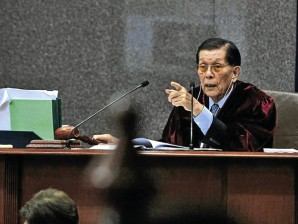Can the government now peek into the bank accounts of private individuals without a court order as required by law?
Senate President Juan Ponce Enrile (JPE) sounded the alarm on Sunday after learning about a purported memorandum of agreement (MOA) that would allow the Anti-Money Laundering Council (AMLC) and the Bureau of Internal Revenue (BIR) to examine private bank accounts despite the absence of a “predicate crime” or court order.
Enrile said the information on the MOA was partly the reason many senators were having misgivings about Malacañang’s push for the chamber to amend the Anti-Money Laundering Law (Amla).
“We learned that there is a MOA between the (Anti-)Money Laundering Council and the BIR (empowering them) to look into the bank accounts of taxpayers,” he said in Filipino in an interview over dzBB radio.
Enrile said though that he had yet to confirm the existence of the MOA. He said that he received the information from another senator and that the Senate committee on banks would investigate the matter.
“Many people would be afraid (but) perhaps the order did not come from Malacañang. It’s the AMLC and the BIR,” he said. “They should follow the law.”
Enrile cited the leak of Chief Justice Renato Corona’s bank records at Philippine Savings Bank, copies of which were submitted by the prosecution to the impeachment court.
Enrile earlier pinned the leak on examiner Jerry Leal of the Bangko Sentral ng Pilipinas, who was part of the audit team that looked into bank accounts of “politically exposed persons,” such as the Chief Justice.
The senator said some of his colleagues were “angry” over the threat that the Philippines would be sanctioned if Congress failed to amend the Amla.
Executive Secretary Paquito Ochoa Jr. earlier wrote Enrile asking the Senate to act on a bill seeking to strengthen the Amla. Ochoa warned of sanctions from the international Financial Action Task Force.
The supposed sanctions would include “delayed (overseas Filipino workers’) remittances, higher charges and intermediation costs on financial transactions of Philippine banks and citizens, and thorough scrutiny of Philippine-based transactions.”
“Some senators are angry because it’s as if we’re being threatened,” Enrile said. “That’s what the senators do not like.”
Senators’ bank records
“If I would have my way, we would finish (the matter) according to the ordinary course of business of the Senate,” he said. “But many senators are against (the issue of the amendment), especially with what happened with PSBank. Many senators are worried that (their bank records might also be leaked).”
Even if Corona’s bank records appeared to have been illegally obtained, the Senate admitted the prosecution’s evidence related to them. But Enrile said those behind the leakage could be the subject of a separate criminal case.
Enrile said the government could scrutinize his bank records, noting that he had no dollar account.
“I’m going to tell them to go ahead, but if they could not find anything because I don’t have a dollar account, they better prepare because I know what I would do to them,” he said.


